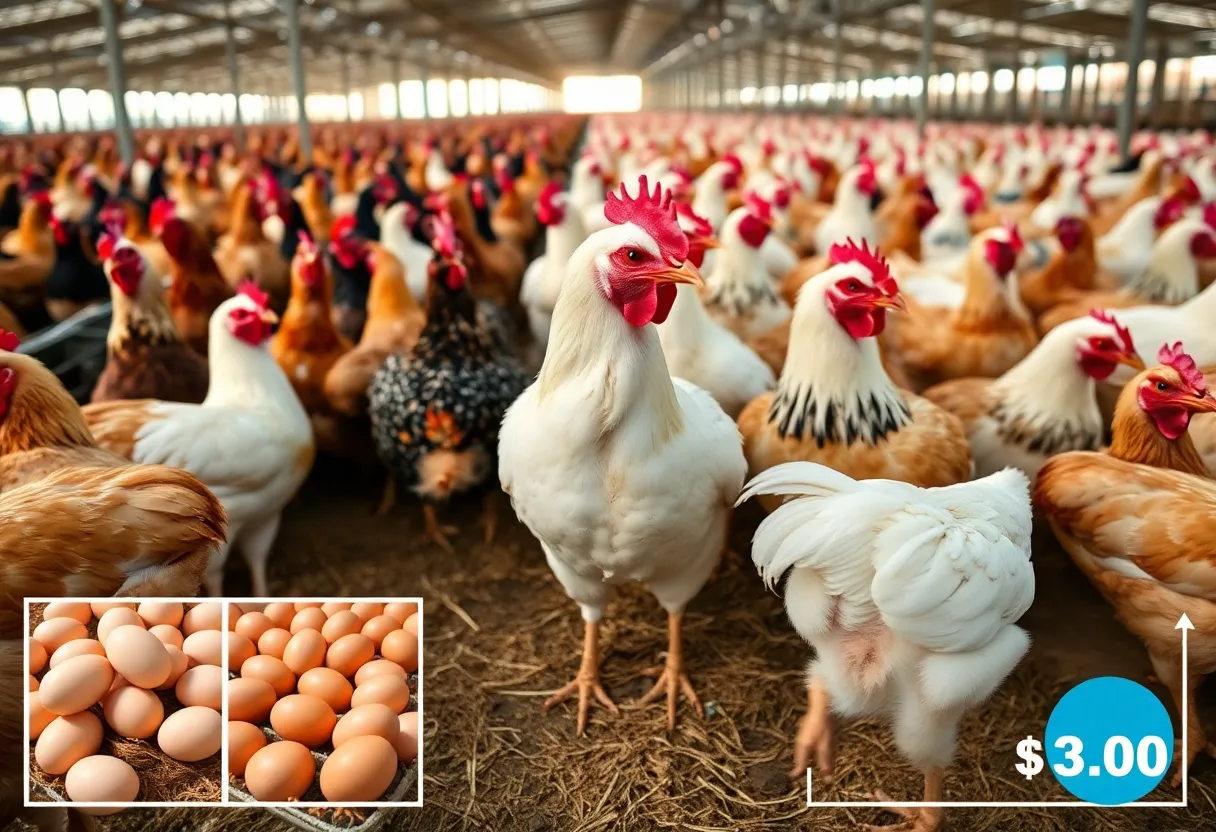Louisville, October 25, 2025
The U.S. egg industry is demanding urgent federal action as Highly Pathogenic Avian Influenza (HPAI) devastates poultry flocks, leading to severe economic impacts and soaring egg prices. Industry representatives are advocating for rapid vaccine development and increased biosecurity funding to protect egg production and food security, particularly in areas like Kentucky that significantly contribute to the agricultural economy. The ongoing crisis poses risks not only to local farms but also to employment and supply chains across the nation.
U.S. Egg Industry Urges Federal Action as HPAI Devastates Flocks
Louisville, KY – The U.S. egg industry, including producers in the Louisville area, is pressing the federal government for immediate intervention as Highly Pathogenic Avian Influenza (HPAI) continues to ravage poultry flocks nationwide. Widespread losses have spiked egg prices and disrupted local supply chains, threatening both economic stability and food security in regions like Kentucky.
Industry representatives emphasize the urgency of developing vaccines quickly and allocating funds for enhanced biosecurity measures. These steps aim to protect the agricultural sector, particularly in states dependent on poultry production. In the Louisville region, suppliers report strained operations as flock depopulation efforts accelerate to contain the virus spread.
Impact on Flocks and Prices
HPAI has led to the culling of millions of birds across the country, with no signs of slowing. This outbreak, one of the most severe in recent history, has forced farms to destroy entire flocks to prevent further transmission. As a result, egg production has plummeted, causing retail prices to climb sharply. Consumers in the Louisville area and beyond are feeling the pinch, with everyday grocery costs rising due to limited availability.
Local producers, who contribute significantly to Kentucky’s agricultural output, face mounting challenges. Reduced supply from affected farms has ripple effects on distributors and retailers, creating bottlenecks in the food supply chain. This situation not only affects immediate availability but also raises concerns about long-term viability for small and mid-sized operations in the region.
Calls for Federal Support
The push for action centers on accelerating vaccine research and deployment. Current control methods rely heavily on biosecurity protocols and flock elimination, which industry groups say are insufficient against the virus’s rapid evolution. Advocates argue that federal investment in vaccine development could provide a more sustainable defense, reducing the need for mass culls and stabilizing production levels.
Funding for biosecurity is another key demand. Enhanced measures, such as improved farm surveillance, better quarantine procedures, and advanced monitoring technology, are seen as essential to limit HPAI’s spread. These investments would safeguard Kentucky’s agricultural economy, where poultry plays a vital role in employment and rural livelihoods. By supporting these initiatives, the government could help restore confidence in the nation’s food supply chains.
Economic and Supply Chain Implications
The economic fallout extends beyond farms to processors, transporters, and retailers. In the Louisville area, businesses reliant on steady egg supplies are adapting to shortages by seeking alternative sources or passing higher costs to customers. This strain highlights the interconnectedness of the agricultural sector, where disruptions in one area quickly affect others.
Kentucky’s position as a hub for poultry production amplifies the issue. The state’s farms supply eggs not just locally but also to broader markets, making regional impacts felt nationwide. Without swift federal response, the ongoing crisis risks deepening economic pressures, potentially leading to job losses and reduced output in the coming months.
Background on HPAI and the Egg Industry
Highly Pathogenic Avian Influenza is a highly contagious viral disease that primarily affects birds, with occasional spillover risks to other species. First detected in the U.S. in early 2022, the current strain has proven particularly aggressive, infecting commercial and backyard flocks alike. The U.S. Department of Agriculture monitors outbreaks, but the scale of this event has overwhelmed traditional response strategies.
The egg industry, valued at billions annually, relies on consistent flock health to meet demand from households, bakeries, and food manufacturers. Kentucky contributes substantially to this sector, with its fertile lands and established farming infrastructure supporting thousands of jobs. Past outbreaks have shown that HPAI can persist for years if not addressed proactively, underscoring the need for innovative solutions.
Efforts to combat the virus include rigorous testing and rapid response teams, but industry leaders maintain that these are reactive rather than preventive. The call for vaccines represents a shift toward long-term resilience, drawing on successful models from other countries that have integrated immunization into their poultry health programs. Biosecurity funding would build on existing frameworks, upgrading facilities to withstand future threats.
As the situation unfolds, stakeholders across the Louisville region and the nation watch closely. The combination of immediate economic relief and strategic investments could turn the tide, ensuring the egg industry emerges stronger. For now, the focus remains on limiting further damage while laying the groundwork for recovery.
FAQ
What is the main issue facing the U.S. egg industry?
The U.S. egg industry, including producers in the Louisville area, is pressing the federal government for immediate intervention as Highly Pathogenic Avian Influenza (HPAI) continues to ravage poultry flocks nationwide.
How has HPAI affected egg prices and supplies?
HPAI has led to the culling of millions of birds across the country, with no signs of slowing. This outbreak has forced farms to destroy entire flocks, causing egg production to plummet and retail prices to climb sharply.
What specific actions are industry representatives requesting?
Industry representatives emphasize the urgency of developing vaccines quickly and allocating funds for enhanced biosecurity measures to protect the agricultural sector.
Why is this crisis significant for Kentucky?
Kentucky’s position as a hub for poultry production amplifies the issue. The state’s farms supply eggs not just locally but also to broader markets, making regional impacts felt nationwide.
What are the broader economic implications?
The economic fallout extends beyond farms to processors, transporters, and retailers. In the Louisville area, businesses reliant on steady egg supplies are adapting to shortages by seeking alternative sources or passing higher costs to customers.
Key Features of the HPAI Impact on the Egg Industry
| Aspect | Description |
|---|---|
| Virus Type | Highly Pathogenic Avian Influenza (HPAI), a highly contagious viral disease affecting birds. |
| Flock Losses | Culling of millions of birds nationwide, including in the Louisville area, to contain spread. |
| Price Impact | Sharp rise in retail egg prices due to plummeting production. |
| Supply Chain Strain | Disruptions affecting local suppliers, distributors, and retailers in Kentucky. |
| Requested Actions | Rapid vaccine development and funding for biosecurity to safeguard the economy and food chains. |
| Economic Scope | Threatens jobs and livelihoods in Kentucky’s poultry sector, with nationwide ripple effects. |





